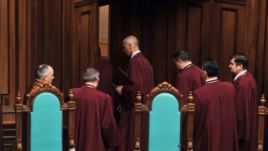Constitution to Order

On 30 May 2013 Ukraine’s Constitutional Court once again came up with the political goods in a judgement just as worthy of EU scrutiny as Kyiv’s latest moves regarding relations with the Customs Union The judgement has direct ramifications for Ukrainians’ electoral rights and the next presidential elections. It also makes it quite clear who is pulling the constitutional strings in Ukraine and completes a process initiated with western approval three years ago.
The 30 May judgement overturns the Constitutional Court’s own previous judgement and allows the next Kyiv Council and Mayoral elections to be held in October 2015, well after the presidential elections. Ihor Koliushko, Head of the Institute for Political and Legal Research is adamant that the CCU judgement only refers to regular elections. Since Kyiv has been without a Mayor for over a year, and the constitutionally stipulated term in office for deputies has now ended, extra elections must still be called. All doubtless correct, however since the constitutional submission was made by MPs from the ruling Party of the Regions after they stymied all attempts in parliament to schedule Kyiv elections, it can be safely assumed that the will to call such elections is missing.
The reason scarcely needs to be spelled out. There has been no Mayor in Kyiv for almost a year, and in any case Chernovetsky’s mayoral powers were seriously reduced in late 2010 when Yanukovych appointed Oleksandr Popov Head of the Kyiv City State Administration. Popov is very much Yanukovych’s man and highly unpopular in Kyiv. Any honestly run elections would almost certainly bring results unfavourable to the Party of the Regions and to the President in the run-up to and during the presidential elections in early 2015.
The CCU Deputy Head, Serhiy Vinokurov explained the judgement by asserting that having all the elections at the same time ensured “stability in the formation of the representative bodies”. Nowhere in the Constitution is it stipulated that all elections take place at the same time.
In fact, the judgement seems to have little to do with the Constitution at all. The election watchdog OPORA has indicated concern that the judgement flouts citizens’ right to local self-government. Viktor Musiaka, Professor of Law and one of the authors of the original Constitution, counts four constitutional norms breached by the 30 May judgement (7 and 38 pertaining to local self-government; 141 – terms in office; and 85 – the Verkhovna Rada’s obligation to schedule elections).
Most commentators, including from the Committee of Voters of Ukraine and the Razumkov Centre, openly speak of more politics than law in the judgement.
Musiaka, moreover, warns that the Constitutional Court has created a very dangerous precedent, with other terms in office, including that of the President, also able to be extended.
Such lengthened terms will presumably also be allowed for the sake of “stability”
Western countries were doubtless prompted by weariness with Ukraine’s chaos and instability when they effectively turned a blind eye to the total change in government in March 2010 soon after Yanukovych was elected President. The change ignored the electoral makeup of the Verkhovna Rada, and overturned a previous Constitutional Court judgement from September 2008. That had found that since parliament was formed on the basis of party lists, only factions, not individuals, could form a ruling coalition. This was ignored, and enough turncoats were, shall we say, found to form a majority around the Party of the Regions. American and EU representatives demanded only that the Constitutional Court be asked for its “assessment”. Asked it was and in April 2010 it came up with a judgement totally opposite to that issued by the same judges on the basis of the same Constitution 18 months earlier.
Since then the Constitutional Court has issued a number of judgements which have caused at very least bemusement to those familiar with Ukraine’s Constitution and the principles of rule of law. These included most memorably the judgement from 1 October 2010 which overturned the 2004 Constitution and simply reinstated the previous Constitution, despite the huge number of fundamental issues this entailed. . The list of such judgements is long, but there is also a considerable number of issues clearly pertaining to constitutionality of this or that law which the Court has refused to consider. The most notorious of such cases concerns the highly contentious Law on State Language Policy signed by the President into force in August 2012 which strengthens the position of the Russian language and makes it possible to run all public affairs in a particular oblast without the official language – Ukrainian.
This demonstrated such apparent disregard for the Constitution, while being so clearly wanted by those in power that refusing to examine it at all must seem the only expedient thing to do. Expedient, that is, for those who believe the Constitutional Court is there to serve politicians and to interpret the Constitution so that it means precisely what they choose it to mean.





